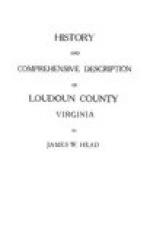A new constitution which should supercede that of 1851 and express the Union sentiments of the Potomac legislators, was accordingly drafted. Nominations of delegates to the constitutional convention were made in January, 1864. By the terms of the act relative thereto, any voter in the State who had not adhered by word or act to the Confederacy since September 1, 1861, might be chosen a member of the convention; all “loyal” citizens, who had not given aid or comfort to the Confederacy since January 1, 1863, possessed the right to vote.
Elections were held January 22, 1864. Very little interest was manifested by the people, as was evidenced by the ridiculously small vote everywhere polled. Loudoun’s nominees, Dr. J.J. Henshaw, J. Madison Downey, and E. R. Giver, were elected by a mere handful of voters.
The convention met at Alexandria February 13, 1864, with fifteen[40] delegates present from twelve counties. Le Roy G. Edwards, of Portsmouth, was elected president and W.J. Cowing, secretary. A number of radical changes in the old constitution, framed by legitimate authority in ante-bellum days, were consummated during the two months’ session of this convention.
[Footnote 40: It should be noted that Loudoun County furnished three of this number.]
The Alexandria government held sway very nearly two years. The legislature met for its second session December 5, 1864, and re-elected J. Madison Downey, of Loudoun County, speaker of the house of delegates.
The Pierpont government was not in itself of great importance. Its influence extended to only a dozen counties and three cities and, “under the shadow of bayonets, it was the rule of a few aliens in the midst of a generally hostile population. Men at the time and since have laughed at its legitimist pretenses.” It would have been summarily dismissed by the people but for the protection afforded it by the Federal armies. Thus it appears that the “Restored Government of Virginia” was not based upon the consent and approval of the governed. Yet, suited to a policy of expediency and aggression, it was, with quivering and unseemly eagerness, recognized as the legal government of the State by the Lincoln administration.
Emancipation.
A significant event of the war was the issuance by President Lincoln of his celebrated emancipation proclamation. This highly important measure, promulgated on New Year’s day, 1863, sounded the death-knell of slavery, an institution that, in the South, had seemed commercially indispensable.
The tidings spread rapidly through Loudoun producing, however, no change in the amicable relations existing between the white and colored races. In all sections of the South some apprehension was at first felt lest the negroes be tempted by Federal rewards to insurrection and the state militias be required to suppress outbreaks.
The people of Loudoun, of course, shared in these early misgivings, but here, as elsewhere, the negroes, as a whole, manifested no outward signs of disaffection. History must record to their credit and praise that while actual warfare was being waged on the soil of Loudoun they quietly awaited the final issue of the fiery struggle.




